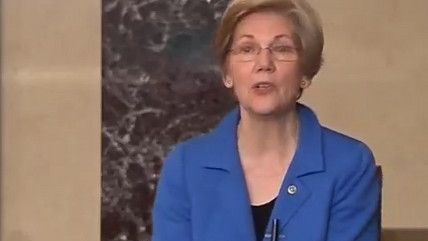Senate Rules Like the One Used to Silence Elizabeth Warren's Criticism of Jeff Sessions are Dumb, Arcane, and Self-Aggrandizing
Senators should not be afforded special privileges shielding them from vigorous criticism.


Sen. Elizabeth Warren (D-Mass.) was told to take her seat during a late-night debate session last night over attorney general designee Sen. Jeff Sessions (R-Ala.) after Senate Majority Leader Mitch McConnell (R-Ky.) invoked the Senate's Rule 19, which states that senators may not "directly or indirectly, by any form of words impute to another Senator or to other Senators any conduct or motive unworthy or unbecoming a Senator." Warren is now barred from speaking on the floor of the Senate until after the vote on Sessions' nomination, which is expected today.
Facing the near certainty of the Republican-controlled Senate voting to confirm Sessions, Democrats have planned to use every available minute of debate time to hit Sessions on his past statements and actions, sometimes invoking iconic figures to drive their point across.
This is what Warren did when she quoted the late Sen. Edward Kennedy (D-Mass.), who in 1986 opposed Sessions' nomination for a federal judgeship by saying, "He is, I believe, a disgrace to the Justice Department and he should withdraw his nomination and resign his position." This quotation drew a warning from Sen. Steve Daines (R-Mont.), who asserted that Warren was in violation of Rule 19—which Warren reasonably found to be a bit of a stretch as Kennedy had been a senator at the time he was speaking about Sessions, who was not yet a senator.
Warren later quoted a letter penned by Martin Luther King's widow, Corretta Scott King, where she addressed the late Sen. Strom Thurmond (R-S.C.) in 1986 to oppose Sessions' nomination to the federal court on the basis that as a U.S. attorney in Alabama, "Mr. Sessions has used the awesome power of his office to chill the free exercise of the vote by black citizens."
This was a bridge too far for McConnell, who said Warren had "impugned the motives and conduct of our colleague from Alabama," and thus invoked Rule 19, forcing a vote that split down party lines, 49-43, to silence Warren for the rest of the debate on Sessions. McConnell later added, "Sen. Warren was giving a lengthy speech. She had appeared to violate the rule. She was warned. She was given an explanation…nevertheless, she persisted."
Other pearl-clutching Republicans like Sen. Orrin Hatch (R-Utah) fretted that Warren's quotations were "offensive" and constituted a "constant diatribe" that would lead the upper chamber of Congress "down a very steep path to oblivion." And because even a stopped clock is correct twice a day, legendary over-legislator Sen. Charles Schumer (D-N.Y.) called the invocation of Rule 19 "selective enforcement" which could in theory be used "virtually every day in the Senate."
Derek Hawkins writes in the Washington Post that Rule 19 came into being following a 1902 fistfight on the floor of the senate between two Democratic lawmakers from South Carolina. It's not clear how often the rule has been invoked, but suffice to say, it's been rare. Bloomberg's Greg Giroux dug up this nugget from 1979, where the rule was used to censure a Republican senator who called a fellow Republican an "idiot" and "devious." Then-Senate Majority Leader Robert Byrd (D-W. Va.)—whose most prominent legacy after 41 years in the Senate was being the "keeper" of the many arcane and self-aggrandizing Senate rules—reportedly brokered a truce between the two sparring Republicans.
While the words of Kennedy and King may not be pleasant to the delicate ears of GOP senators, to characterize them as beyond the absurdly stuffy rules of senate decorum is ridiculous. Whether one agrees with her point or not, Warren was attacking Sessions' professional conduct before he was in the senate—it was not an ad hominem personal attack, and should absolutely be fair game for debate.
Regardless, it's simply ridiculous that senators should enjoy special privileges shielding them from vigorous criticism just as they are about to be promoted to cabinet-level positions. Debates over confirmations are precisely when the gloves should come off, and lawmakers should be able to defame and defend their colleagues based on fact-based arguments and not hide behind superficial pretenses of collegiality.


Show Comments (184)